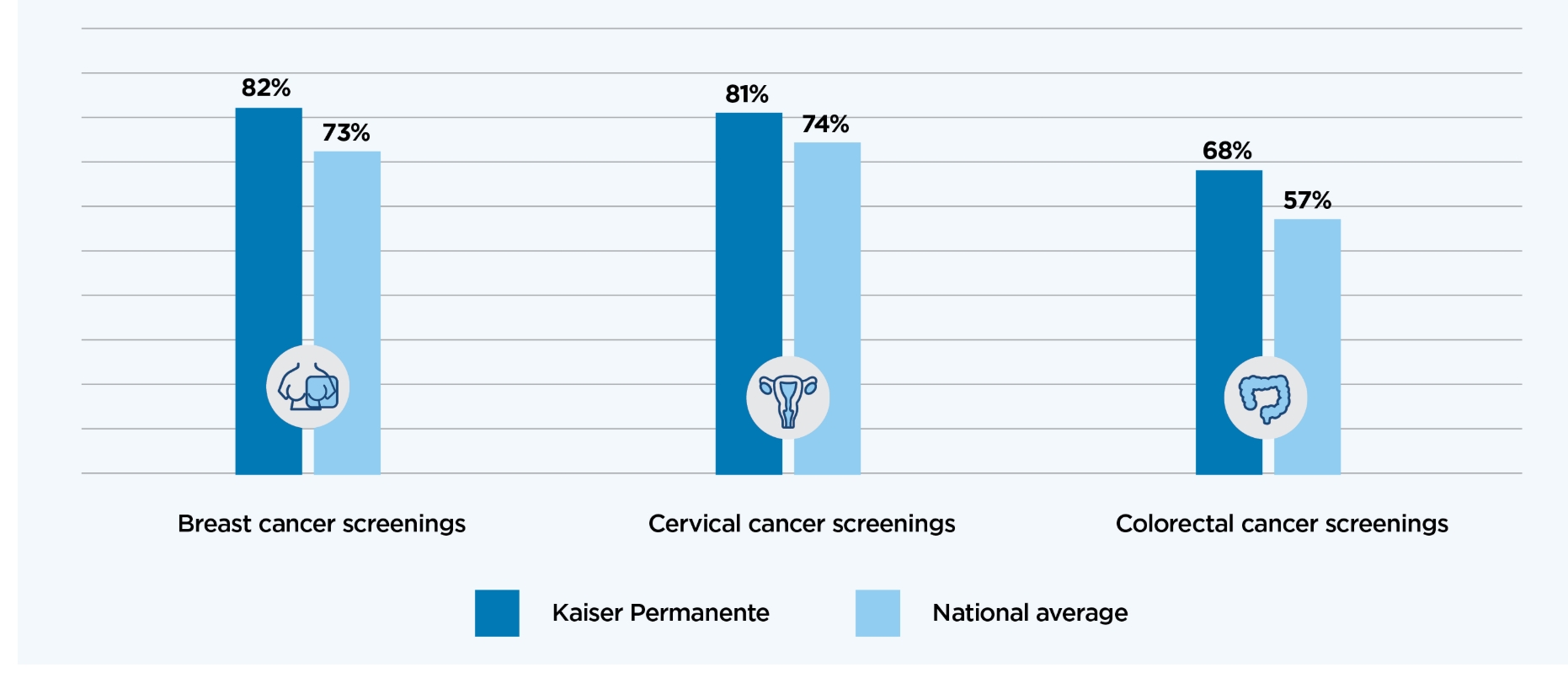
We are leaders in early cancer detection, diagnosis, and treatment—enabled by our integrated approach to care.
Early cancer diagnosis saves lives — and lowers health care costs

On average, early-stage cancer treatment is 2.4 times less costly than treatment for advanced cancer. And depending on the type of cancer, it can be up to 7 times less costly.3

Superior preventive care is key
Our system is designed to identify potential risks and diagnose existing health issues before they become serious and costly. Through proactive screening, prevention, and early intervention, we help patients better manage chronic conditions and serious illnesses — or even avoid them altogether.
Plus, embedded electronic alerts remind care teams and members about upcoming or overdue screenings — so even if a patient can’t remember when they had their last screening, they’ll know when they need a new one. And data from more than 12 million members helps us continuously optimize our preventive care practices and spread them quickly across Kaiser Permanente.
Seamless coordination when every minute counts
Our connected system speeds up the timeline between screening, diagnosis, and treatment. Our members don’t bounce around between different specialists in different locations with medical records in tow — they have seamless support at every step.
In our communities, Kaiser Permanente members are 20% less likely to experience premature death due to cancer.
- Kaiser Permanente 2023 HEDIS® scores. Benchmarks provided by the National Committee for Quality Assurance (NCQA) Quality Compass® and represent all lines of business for commercial plan members. Kaiser Permanente combined region scores were provided by the Kaiser Permanente Department of Care and Service Quality. The source for data contained in this publication is Quality Compass 2023 and is used with the permission of NCQA. Quality Compass 2023 includes certain CAHPS data. Any data display, analysis, interpretation, or conclusion based on these data is solely that of the authors, and NCQA specifically disclaims responsibility for any such display, analysis, interpretation, or conclusion. Quality Compass® and HEDIS® are registered trademarks of NCQA. CAHPS is a registered trademark of the Agency for Healthcare Research and Quality.
- Joel V. Brill, “Screening for Cancer, the Economic, Medical, and Psychosocial Issues,” American Journal of Managed Care, November 16, 2020
- Mariotto et al., Cancer Epidemiology, Biomarkers & Prevention, 2020.
- Cancer Facts and Figures 2024, American Cancer Society, 2024.
- Employer Insights Report 2024,” Color Health, 2024.
Value-based care is a health care delivery and financing model that improves health outcomes and increases access to affordable care in the community, achieved through:
- Evidence-based care
- A commitment to health equity
- Simplicity for consumers, customers, and providers
- Aligned incentives across the system
After Stage 4 ovarian cancer, she’s still going strong.
Donna Budway received prompt surgery followed by chemotherapy. She credits her care team with extending her life.
Cutting cancer risk through targeted expansion of genetic testing
Kaiser Permanente care teams identify and educate high-risk patients about their genetic risks and provide coordinated support.